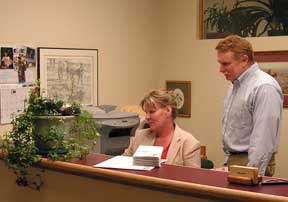 |
Previous Issues |
| Cedar Mill Community Website |
|
| About Cedar Mill News |
|
||||||
| Volume 7, Issue 2 | February 2009 |
|||||
Featured Business
|
 |
| Shade's assistant Dorie Fimon has been with him ten years |
This is especially true in the practice of family law. Shade says, “Bringing resolution to a problem, or calm to a chaotic family situation is rewarding. Often I can alleviate fears and stress. My job can also be frustrating, as when a client would rather be the righteous victim, even if that isn’t helpful. If my family law client doesn’t understand that the kids come first, I’m not the right lawyer for them.”
In Washington County, families with children who are seeking a divorce must take a four-session parenting class and if they can’t resolve their parenting issues, they must work with a county mediator. If they still can’t come to an agreement, the court may order a family study so that an evaluator can make recommendations.
He notes that about half of all children in the U.S. don’t live in what we once thought a “typical” family unit, with both biological parents who are married.
He says that since September all his clients have some kind of story relating to the bleak economic environment. He has probate estates that can’t be settled because houses aren’t selling. And when it comes to dividing up the assets in a marriage, in these tough economic times an asset divided can become a liability. He’s been working with one couple that own a business together. They have been unable to sell it, and they realize that they will have to find a way to work together despite their divorce, or lose the business—they can’t afford to fight.
Shade recommends that anyone with children at least needs a will that addresses guardianship and conservatorship issues and an Advance Directive. He offers a basic package for around $500 that suffices for most of his clients. This includes an introduction into disability and death issues and drafting appropriate planning documents. When trusts are added to the mix for estates without anticipated estate tax consequences, cost is generally about $1000. For estates requiring inheritance tax planning or other, more complex issues, the cost will be more.
The threshold for paying federal estate taxes has risen so much that fewer than 1% of the estates for people dying this year will pay, and if not soon amended the law will (temporarily) eliminate these taxes. Shade says that the future is uncertain and nobody really knows what will happen. More estates still face the prospect of the Oregon inheritance tax.
Shade used to belong to the Cedar Mill Business Association (CMBA) when it was more of a “social club” and he lost interest. He rejoined a few years ago and is glad that the organization is more active. He appreciates the group’s activities that show pride in the local community, such as the landscaping work and the work with the schools. He wants to see it continue to meet both business and community needs.
He has been the Secretary of the CMBA since 2007 and began his tenure by simplifying and updating the CMBA bylaws. He has written up a new contract for the Administrator position, and is advocating for a more businesslike organization with an annual budget and better reporting.
“I’m not a networking, advertising kind of guy,” he says. “But now when I walk into the meeting, it’s a room full of friends. I’m not sure if I’m making any extra money from my CMBA involvement, but there’s definitely a personal benefit in getting to know the people involved with other local businesses.”
Shade is an outdoorsman whose hobbies include fishing, elk hunting, and camping. He enjoys watching his kids’ sports. He reads the news, and rarely misses a crossword or sudoku puzzle. He is also active at St Andrew Lutheran Church.
Dean invites you to contact him with legal questions by calling his office at 503-644-5539. His office is located at 13765 NW Cornell, and his email address is dshadelaw@earthlink.net
Cedar Mill Business Association
Published monthly by Cedar Mill Advertising & Design
Publisher/Editor:Virginia Bruce
503-629-5799
PO Box 91061
Portland, Oregon 97291